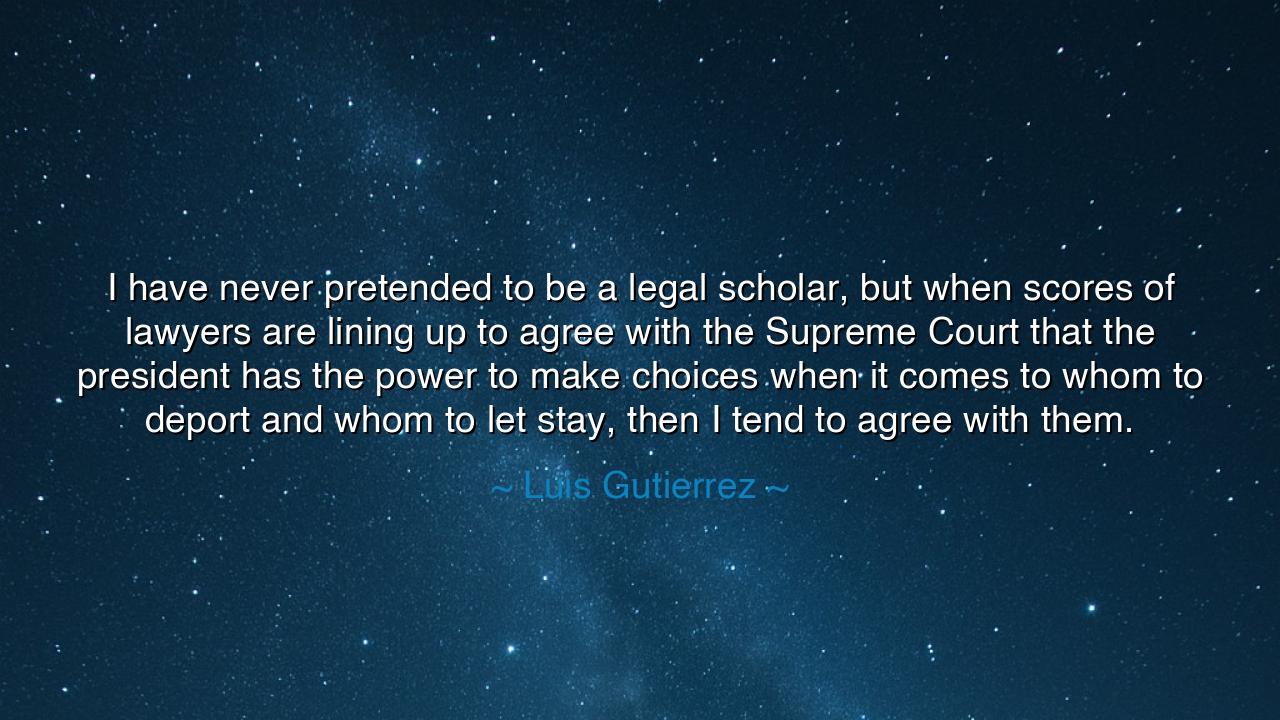
I have never pretended to be a legal scholar, but when scores of
I have never pretended to be a legal scholar, but when scores of lawyers are lining up to agree with the Supreme Court that the president has the power to make choices when it comes to whom to deport and whom to let stay, then I tend to agree with them.






The words of Luis Gutierrez, “I have never pretended to be a legal scholar, but when scores of lawyers are lining up to agree with the Supreme Court that the president has the power to make choices when it comes to whom to deport and whom to let stay, then I tend to agree with them,” carry both humility and conviction. They speak to the balance between law and leadership, between the technical and the moral, between what is written in books and what is inscribed upon the heart. Gutierrez, a lifelong advocate for immigrant justice, reminds us that true wisdom is not always found in the mastery of law, but in the courage to trust both reason and compassion when they meet in the same truth. His words shine with the light of democratic faith — the belief that power, when exercised with mercy, is not tyranny, but stewardship.
The origin of this quote lies in the great debates over immigration policy in the United States — debates that cut to the heart of what kind of nation America wishes to be. The Supreme Court, in its long history, has affirmed that the president holds discretion in the enforcement of immigration laws: that not every person without documentation must be expelled, and that the executive may choose mercy as an act of justice. Gutierrez’s statement acknowledges this — that the rule of law and the act of compassion are not enemies, but partners when guided by wisdom. In saying he “tends to agree,” he bows not merely to authority, but to the collective judgment of those learned in law, while keeping faith with the greater ideal that the law must serve humanity, not crush it.
From the earliest civilizations, leaders have wrestled with the same dilemma: when to apply the full weight of law, and when to temper it with mercy. In ancient times, the Code of Hammurabi was carved into stone — a symbol that justice should be unyielding. Yet even then, the wisest kings understood that a law too rigid becomes cruelty. The great ruler Solon of Athens, famed for his wisdom, once said that justice must be flexible, like the nets of fishermen — strong enough to hold, yet supple enough not to break. In this spirit, Gutierrez defends the president’s discretion to decide “whom to deport and whom to let stay,” as an act not of defiance against the law, but of fidelity to its purpose — to uphold order while honoring human dignity.
Beneath his humility lies a deeper courage. When Gutierrez declares, “I have never pretended to be a legal scholar,” he speaks as the voice of the common man, acknowledging his place among those who feel the consequences of law rather than those who interpret it. Yet in the same breath, he declares his trust in the institutions of justice — the courts, the lawyers, and the Constitution — to protect fairness. His words carry a timeless truth: wisdom is not in claiming knowledge, but in knowing whom to trust. The ancients called this sophrosyne — soundness of mind, the virtue that balances reason and humility.
To understand his heart, one might recall the story of President Abraham Lincoln, who, during the Civil War, chose mercy over punishment for thousands of deserters and prisoners. When criticized for his leniency, Lincoln replied, “I have always found that mercy bears richer fruits than strict justice.” Gutierrez’s belief in presidential discretion springs from that same well — that the executive power, when guided by compassion, strengthens rather than weakens the moral authority of a nation. For the purpose of government is not merely to punish, but to discern — to know when the law should heal and when it must discipline.
Yet, his quote also warns of a deeper lesson: that law without humanity becomes tyranny, and humanity without law becomes chaos. The harmony between them — that sacred middle path — is what defines a civilized nation. Gutierrez urges us to see the president’s role not as an unyielding executor, but as a steward of both justice and mercy. In recognizing that power can serve compassion, he reaffirms that the spirit of democracy lies not in cold legality, but in moral discernment.
Let these words be carried forward as a teaching to all who lead, and to all who are led: do not mistake wisdom for knowledge, nor compassion for weakness. A society that honors both the law and the human heart will endure through every storm. In your own life, seek balance — in judgment, in speech, in action. Respect authority, but never cease to call upon conscience. For as Gutierrez reminds us, true justice is not the blind striking of the gavel, but the steady hand that holds it — a hand that remembers mercy even as it enforces law, and that knows the highest power is that which chooses righteousness over rigidity.






AAdministratorAdministrator
Welcome, honored guests. Please leave a comment, we will respond soon